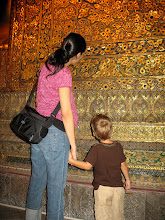As several members of our families have asked us about making donations to various causes here in Bangladesh, I thought it might be useful if I profiled local organizations that I feel are doing good work.
The first is
StreetWise, a school for street children. StreetWise is a relatively new organization, founded in 2006. They have about 30 children, aged 4-15, who meet in a rented apartment near the slum area where they live. They are divided into two groups, a younger group and an older group, each with a teacher. They learn the basic subjects following a standard Bangladeshi curriculum. They also learn practical skills such as cooking and personal care.

There are many schools for street children in Dhaka, including several that are bigger and more well-known than StreetWise. However, one of the reasons why I believe strongly in StreetWise is because of its founder, Anita Aparna Muyeed. Aparna's premise and the philosophy behind much of StreetWise's work is that she wants to give poor children a world-class education. She doesn't want to simply teach them to read and write or give them vocational skills like embroidery, in the hopes that they will eke out a living making handicrafts. She wants to give them access to the same quality of education that children get at the best international-standard private schools in the country -- one of which she worked at herself as a teacher for several years.

Aparna's beliefs fall in line with liberation theology's concept of a "preferential option for the poor," which I first read about in the book
Mountains Beyond Mountains, about Paul Farmer. My favorite description of the concept comes from one of Farmer's own books,
Pathologies of Power. He is discussing charity and medical care and describes the common attitude as, "the homeless poor are every bit as deserving of good medical care as the rest of us." Sounds reasonable enough. However, he goes on to rephrase the sentence to represent a preferential option for the poor, writing, "the homeless poor are more deserving of good medical care than the rest of us." To me, that quote summarizes the concept. Substitute "a good education" for "good medical care," and I think you'll have something approximating the guiding philosophy of StreetWise.
Simply put, the homeless poor are more "deserving" of a good education than the rest of us because they need it more. They have nothing else to help them improve their situations: no money, no family connections, no resources, nothing. They have nothing else going for them and, quite the opposite, a whole lot working against them. When these children are not in school, they are surrounded by drugs, violence, and prostitution. They are victims of abuse on every scale, from the individual to the societal. They desperately need the safety, routine, positive role models and mental stimulation of a good school, much more so than the typical middle-class child. A good education can provide these children with a way out of a horrible situation -- physically, emotionally, and mentally. They need a good education more than the rest of us. StreetWise is working to provide that for them.
Aparna has big dreams for StreetWise: she wants to build an international standard boarding school where the children can live in a safe, positive environment and focus on their education without the distractions, obstacles and responsibilities of life on the street. Cynics will undoubtedly say that all of this is unrealistic or worse, possibly even a waste of resources. However, I would again point to Paul Farmer and the organization that he started,
Partners in Health (PIH). PIH provides high-quality medical care to the destitute poor around the world. Good medical care is a lot more expensive and difficult to provide than a good education, so I think his work is evidence that Aparna's dream is very much in the realm of reality. After all, we all make preferential options for our own children; StreetWise believes that it's time to make them for the children of the poor.













 :: Jungle trekking. Note the muddy boots and pants. Rainy season = mud. ::
:: Jungle trekking. Note the muddy boots and pants. Rainy season = mud. :: :: Orangutan in the wild ::
:: Orangutan in the wild :: :: Mystery water creature ::
:: Mystery water creature :: :: View of the Petronas Towers from the observation deck of the KL Tower ::
:: View of the Petronas Towers from the observation deck of the KL Tower ::


